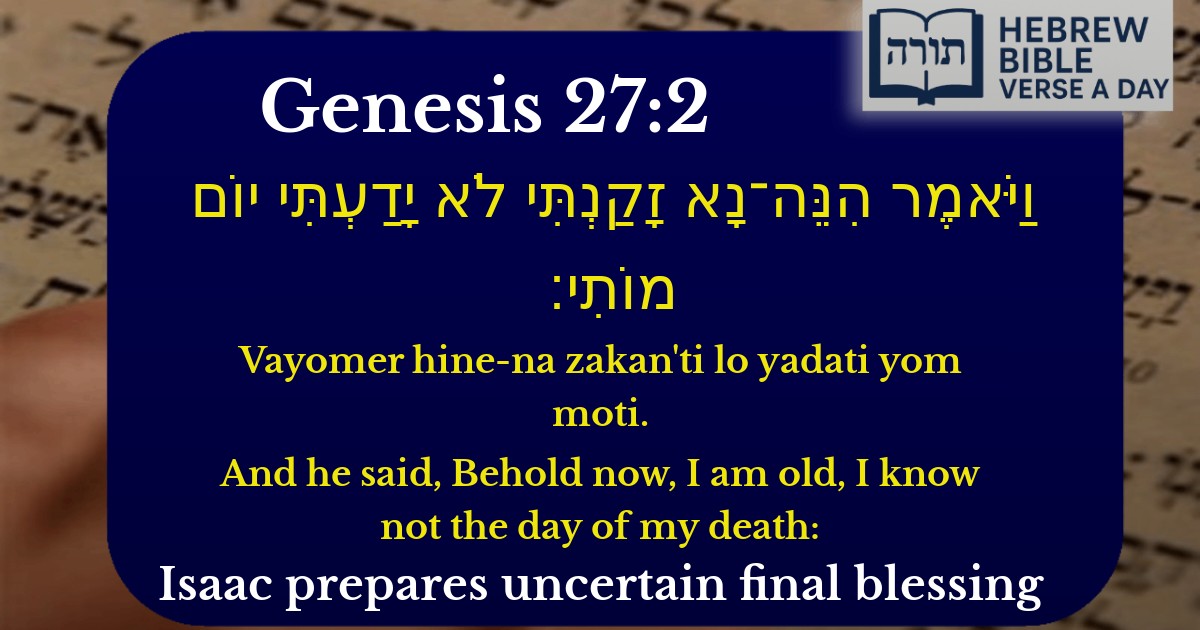Join Our Newsletter To Be Informed When New Videos Are Posted
Join the thousands of fellow Studends who rely on our videos to learn how to read the bible in Hebrew for free!
Hebrew Text
וַיֹּאמֶר הִנֵּה־נָא זָקַנְתִּי לֹא יָדַעְתִּי יוֹם מוֹתִי׃
English Translation
And he said, Behold now, I am old, I know not the day of my death:
Transliteration
Vayomer hine-na zakan'ti lo yadati yom moti.
Hebrew Leining Text
וַיֹּ֕אמֶר הִנֵּה־נָ֖א זָקַ֑נְתִּי לֹ֥א יָדַ֖עְתִּי י֥וֹם מוֹתִֽי׃
וַיֹּ֕אמֶר הִנֵּה־נָ֖א זָקַ֑נְתִּי לֹ֥א יָדַ֖עְתִּי י֥וֹם מוֹתִֽי׃
🎵 Listen to leining
Parasha Commentary
📚 Talmud Citations
This verse is quoted in the Talmud.
📖 Bava Batra 143a
The verse is cited in a discussion about the transfer of property and the validity of a gift given in contemplation of death.
📖 Sanhedrin 91b
The verse is referenced in a discussion about the nature of death and the uncertainty of its timing.


Context of the Verse
The verse (Bereshit 27:2) records Yitzchak's words to his son Esav, expressing his awareness of his advanced age and uncertainty about the day of his death. This statement sets the stage for Yitzchak's intention to bless Esav before his passing.
Rashi's Explanation
Rashi comments that Yitzchak was 123 years old at this time and feared he might die soon, as his mother Sarah had passed away at 127 (Bereshit 23:1). He calculated that if he lived no longer than Sarah, his remaining years would be few. Rashi notes that in fact, Yitzchak lived until 180 (Bereshit 35:28), demonstrating that one cannot know their lifespan with certainty.
Ibn Ezra's Insight
Ibn Ezra suggests that Yitzchak's statement reflects the natural concern of an elderly person who senses their physical decline. The phrase "I know not the day of my death" indicates Yitzchak's humility and recognition that life and death are in Hashem's hands alone.
Midrashic Interpretation
The Midrash (Bereshit Rabbah 65:12) connects this verse to the concept of zechut avot (merit of the forefathers). It explains that Yitzchak, though righteous, did not presume upon his merits to know his lifespan, teaching that even the most virtuous must approach mortality with humility.
Halachic Perspective
Rambam (Hilchot Teshuva 9:1) derives from this verse the importance of constant repentance, as one never knows when death may come. This aligns with Yitzchak's awareness that life is uncertain, even in old age.
Spiritual Lessons